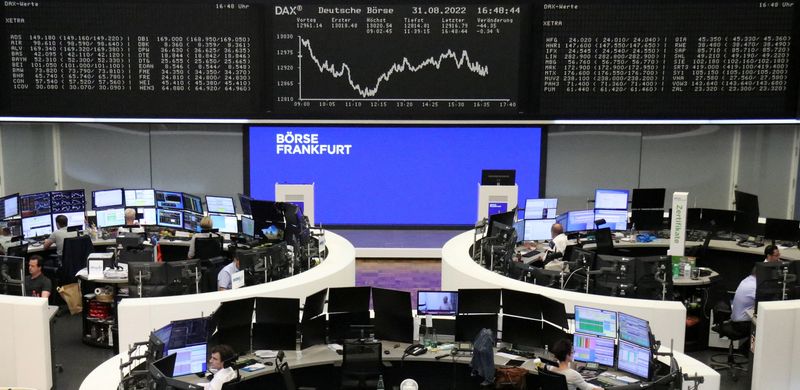By Anisha Sircar and Shreyashi Sanyal
(Reuters) -European stocks got September off to a weak start on Thursday, falling to seven-week lows on deepening worries about economic growth, aggressive interest rate hikes and record-high inflation. The pan-European STOXX 600 fell -1.8% as all sectors traded lower, with the index clocking its fifth straight day in the red. Euro zone manufacturing activity shrank for a second month in August, according to a survey that showed weak demand meant factories were unable to sell as much as they made and built up stocks of finished goods at a record pace. That followed data on Wednesday showing inflation in the bloc hit another record high last month. Money markets priced in a roughly 80% chance for a 75 basis point rate hike by the European Central Bank when it meets next week, up from a just over a 50% chance before Wednesday's data.
"Given policymakers' modus operandi on either side of the Atlantic clearly favours erring on the side of hawkish ... even at the expense of recession, it seems hard to envision the ECB opting not to deliver such an outsized move," said RaboBank strategists Richard McGuire and Lyn Graham-Taylor. Adding to the gloom, one of China's biggest cities, Chengdu, announced a lockdown as it launched four days of citywide COVID-19 testing. China-exposed miners plunged 3.8% to lead European losses as metals prices tumbled, while luxury stocks also came under pressure. Louis-Vuitton owner LVMH, Kering (EPA:PRTP) and Hermes were down between 2.2% and 2.5%.
Defensive plays including utilities and telecoms recorded the smallest of declines. Germany's Lufthansa fell 3.1% after a pilots' trade union announced a 24-hour strike for Friday as the two parties failed to reach an agreement on wages. Reckitt Benckiser fell 5.2% after announcing that Chief Executive Laxman Narasimhan will step down at the end of September after three years in the role. Data showed German retail sales rose unexpectedly in July, up 1.9% on the month as online retail and the food sector showed recovery. Analysts had predicted sales would stagnate.

The reading came as a rare bright spot as soaring gas prices following Russia's invasion of Ukraine have had a knock-on effect on costs of goods and services.
"If we see a slightly better consumer energy situation going into winter, that could help lift consumer confidence slightly, which will have benefits of that in the wider economy like the retailers," said David Jones, chief market strategist at Capital.com.